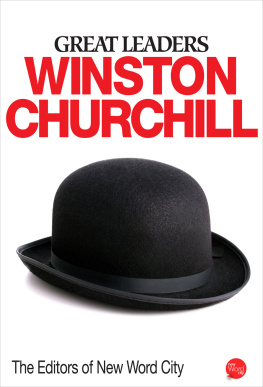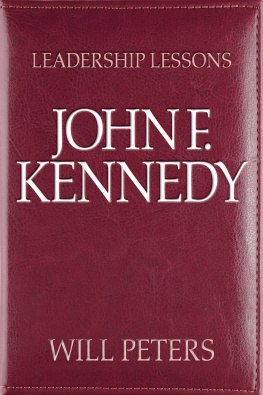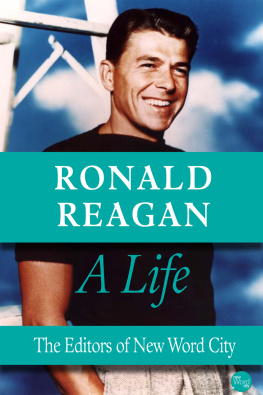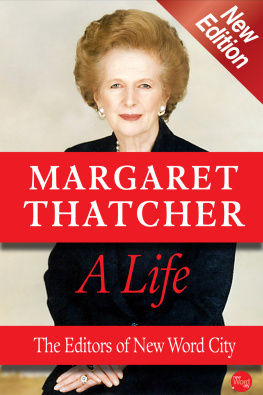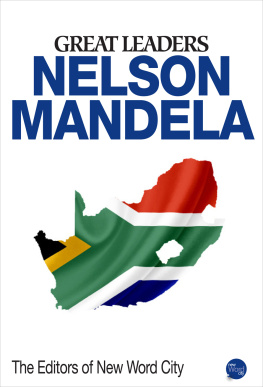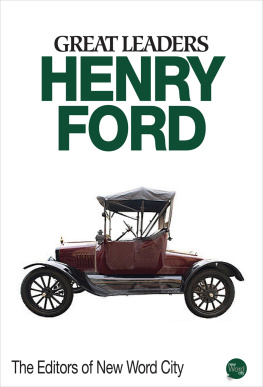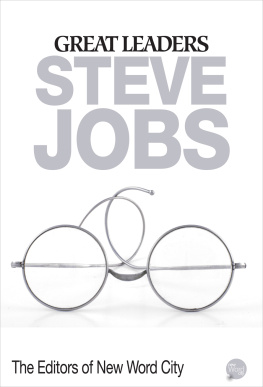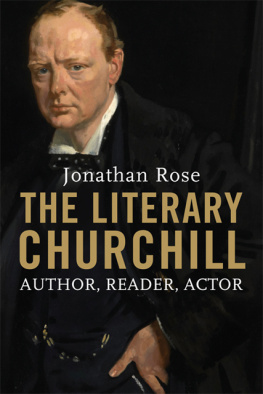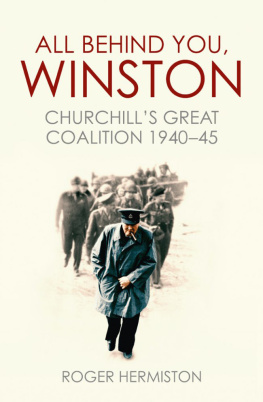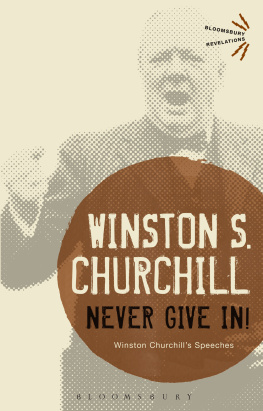The Editors of New Word City - Winston Churchill
Here you can read online The Editors of New Word City - Winston Churchill full text of the book (entire story) in english for free. Download pdf and epub, get meaning, cover and reviews about this ebook. year: 2014, publisher: New Word City, genre: History. Description of the work, (preface) as well as reviews are available. Best literature library LitArk.com created for fans of good reading and offers a wide selection of genres:
Romance novel
Science fiction
Adventure
Detective
Science
History
Home and family
Prose
Art
Politics
Computer
Non-fiction
Religion
Business
Children
Humor
Choose a favorite category and find really read worthwhile books. Enjoy immersion in the world of imagination, feel the emotions of the characters or learn something new for yourself, make an fascinating discovery.
- Book:Winston Churchill
- Author:
- Publisher:New Word City
- Genre:
- Year:2014
- Rating:4 / 5
- Favourites:Add to favourites
- Your mark:
- 80
- 1
- 2
- 3
- 4
- 5
Winston Churchill: summary, description and annotation
We offer to read an annotation, description, summary or preface (depends on what the author of the book "Winston Churchill" wrote himself). If you haven't found the necessary information about the book — write in the comments, we will try to find it.
Sir Winston Churchills particular blend of talents made him uniquely fitted to carry Great Britain through the ordeal of World War II. It was his determination to rally his fellow citizens that not only saved his country but, in all likelihood, all free peoples. Leaders everywhere can benefit by emulating him. This short-form book shows how.
The Editors of New Word City: author's other books
Who wrote Winston Churchill? Find out the surname, the name of the author of the book and a list of all author's works by series.
Winston Churchill — read online for free the complete book (whole text) full work
Below is the text of the book, divided by pages. System saving the place of the last page read, allows you to conveniently read the book "Winston Churchill" online for free, without having to search again every time where you left off. Put a bookmark, and you can go to the page where you finished reading at any time.
Font size:
Interval:
Bookmark:
It was three in the morning on May 11, 1940. Great Britain was embroiled in what looked like a catastrophic war, and Winston Churchill was just going to bed after his first day as prime minister. A prudent man might have felt a sense of impending doom, but not Churchill. I felt as if I were walking with destiny, he wrote later, and that all my past life had been but a preparation for this hour and this trial.
And so it had. Churchills unwavering patriotism, his bulldog tenacity and fighting will, and, above all, his soaring rhetoric inspired the British people to a gallant defense of their island nation that set a new bar for national heroism and earned him a place among the pantheon of the worlds greatest leaders.
Winston Churchill was far from perfect. He was a hero, yes, but a human one. He could be petty, irascible, and self-centered. He relished a practical joke, but he had courage and a born politicians sense of the public stage. And when a bulldog was exactly what England needed, he was there. In his first speech as prime minister, in words as splendid as any ever uttered under such dire circumstances, he told his people, I have nothing to offer but blood, toil, tears, and sweat.
That stark message and subsequent ones and Churchills actions as a leader somehow roused the British to a stoic bravery that would carry them through the Blitz, years of misery, and hundreds of thousands of deaths. In the end, Churchill was a regal figure, his life one that not even William Shakespeare could have imagined. He had inspired his people, saved them, really, from the yoke of Nazi tyranny. He had transcended politics to become the greatest statesman in his countrys long history and an inspiration to the world.
Winston Leonard Spencer Churchill was born at 1:30 a.m. on November 30, 1874, amid the splendor of Blenheim Palace. The estate and its 300-room manor house had been awarded to his ancestor John Churchill, the first Duke of Marlborough, by a grateful king. His parents were both noble and exceptional: Lord Randolph Churchill, son of the Seventh Duke of Marlborough, member of Parliament, first secretary of state for India, and chancellor of the Exchequer, and Jennie Jerome, the ambitious and beautiful daughter of a New York financier.
Churchill was small for his age, sensitive, and emotional. He could also be pushy. In the style of the day, he was raised by a much-loved nanny, Elizabeth Anne Everest. When he came to power as Britains prime minister, it was her picture that hung over his desk.
Churchill spoke rarely to his father, but he wrote often to his mother, pleading with her to visit or let him come home. He grew up a free spirit and an intuitive rebel, doing well only at tasks that he appreciated. His father worried that his sons poor grades at school meant that the boy was intellectually slow.
Churchill first enrolled in a small private school, where, at the age of fourteen, he was caned dozens of times. His father chose Harrow over the more prestigious Eton. There, Churchill earned high marks in English and history and became the schools fencing champion. When he went on to the Royal Military College at Sandhurst, he had to take the entrance exam three times. When given the choice, he opted for the cavalry over the infantry because the required grade was lower and the cavalry curriculum didnt include math.
Churchill struggled to overcome a speech impediment, variously described as a stutter and a lisp. In sharp contrast to his stormy public life, his marriage to Clementine was a sea of tranquility. They met while he was campaigning in Dundee. The granddaughter of a Scottish earl, she was schooled at The Sorbonne. A committed liberal, she was bright, beautiful, and a decade younger than Churchill. He proposed to her in the garden of Blenheim Palace. Their wedding in 1908 was the highlight of the social season.
Churchill remarked later in his life that the two of them did, indeed, live happily ever afterwards.
The Churchills would have five children, one of whom died in infancy. From time to time, he suffered from depression, which he called the black dog, and it was partly to deal with it that he took up painting as a hobby. In time, his impressionist landscapes garnered critical attention as well as popular acclaim. In recent years, the paintings have sold for as much as a million pounds.
All his life, Churchill would be plagued by money problems. While his family was well off, his father died young, most likely from a brain tumor, and both he and his mother had a talent for lavish living. When he graduated from Sandhurst in 1894 and became a junior officer in the Fourth Queens Own Hussars, he was paid 300 pounds a year, but he calculated he needed another 500 pounds to match the living standard of his fellow officers. When his mother agreed to an allowance of 400 pounds, he overspent it.
Churchills plan was not to pursue the traditional Army career of promotion through the ranks, but to use his familys connections to secure postings to campaigns that promised battle. He also planned to secure fame and fortune by serving as a war correspondent and publishing books about his travels, as his father had done before him. As it turned out, his writing would be his main source of income, although at numerous times he came close to going broke.
Characteristically, Churchill acted quickly on his plan. His regiment was to ship out to India, but only after a lengthy leave, and he used the interval to travel to Cuba. The island was rebelling against Spain, and Churchill negotiated a contract to write about the war for the Daily Graphic. He was delighted when he first saw action on his twenty-first birthday, riding with the Spanish forces as they hunted down insurgents. He reported that the Spanish regime was so corrupt that the revolution was justified, and he asserted that the rebels couldnt possibly run a country. Churchill had gone to Cuba sympathizing with the insurgents, only to be disconcerted when he discovered that the Spanish felt about their empire the same way the British felt about theirs. His own jingoism, instilled by his father and nourished by childhood reading of the novels of Rudyard Kipling and H. Rider Haggard, had been further stoked by the headmaster of Harrow, an ardent devotee of the British Empire and all it stood for. And the delights of empire were underscored for Churchill when his regiment arrived in Bangalore. With two fellow officers, he shared a bungalow teeming with servants. The Hussars drilled in the mornings, played polo in the early evenings, and raised many glasses in the cool of the nights.
Always a realist, Churchill recognized that his purely technical education lacked intellectual refinement, and now he set out to remedy that deficiency with a reading list that began with Edward Gibbons Decline and Fall of the Roman Empire and Thomas Macaulays The History of England from the Accession of James the Second. The style of his chosen authors would shape his own rhetoric in later years. A passage on slave ships in Winwood Reades The Martyrdom of Man - Never was so much suffering condensed into so small a space - found its echo in Churchills tribute to the Royal Air Force after the Battle of Britain: Never in the field of human conflict was so much owed by so many to so few.
Even with its many amenities, garrison duty in Bangalore was boring. When Churchill heard of an insurrection in 1897 in Swat, then on Indias northwest frontier and now in Pakistan, he joined the force sent to quell it - and also to cover the expedition for Londons Daily Telegraph and The Pioneer, the Indian paper for which Kipling had worked. Churchill fought with gusto in the ensuing Siege of Malakand, eventually expanding his dispatches into a book, The Story of the Malakand Field Force
Next pageFont size:
Interval:
Bookmark:
Similar books «Winston Churchill»
Look at similar books to Winston Churchill. We have selected literature similar in name and meaning in the hope of providing readers with more options to find new, interesting, not yet read works.
Discussion, reviews of the book Winston Churchill and just readers' own opinions. Leave your comments, write what you think about the work, its meaning or the main characters. Specify what exactly you liked and what you didn't like, and why you think so.

